Embarking on the journey to find the perfect mattress is essential for achieving restful sleep and enhancing your overall health. The quest to pinpoint a mattress that caters to your specific requirements can vastly elevate the quality of your slumber and, in turn, your well-being. Navigating a sea of options might seem daunting, but fear not. As we delve into the essentials of mattress selection, we’ll cover everything from various types and their distinct advantages to size, longevity, budget, and quality considerations. Armed with this knowledge, you’ll be well-equipped to make a choice that complements your sleep patterns and enriches your health. Get ready to embark on a journey to discover not just any mattress but the one that will usher in your most rejuvenating sleep yet!
Assess your sleep needs first
Before embarking on the mattress-buying journey, assessing your sleep needs is important. That way, you’ll know exactly what you’re looking for! Consider factors such as your preferred sleep position – whether you’re a side, back, or stomach sleeper – which can impact the type or density of mattress that works best for you. Personal health and comfort concerns should be factored in, too: any specific back or joint issues, whether you sleep hot or cold, your body weight, and if you have any allergies or sensitivities. Understanding your individual sleep needs will help guide you towards a mattress that offers support and comfort.
What are the different types of mattresses and their benefits
There are various types that are available, each with its own set of advantages. Let’s dive a little deeper into each one, and decide which might be best for you…
Memory foam mattresses
Memory foam mattresses conform to your body, relieving pressure points and providing excellent support. Ideal users include those with back, neck and hip pain and those who feel they need extra support. Cold sleepers also enjoy memory foam, as it tends to retain heat. However, memory foam combined with something like bamboo can make it enjoyable for warm sleepers, too – as this counteracts the heat retention.
Innerspring mattresses
Innerspring mattresses offer bounce and responsiveness and are also typically the most easily accessible on the market. These are widely available and cater to various sleep preferences. Particularly favoured by those who sleep hot, innerspring mattresses are designed to facilitate better air circulation, thereby offering a cooler sleeping experience. They are also a go-to choice for sleepers who lean towards a softer, more yielding surface rather than an overly firm one. This unique construction featuring coiled springs provides a harmonious balance of support and comfort. This makes them a versatile option, suitable for various sleeping styles, and a long-standing favourite in many households.
Latex mattresses
Latex mattresses are durable, hypoallergenic and supportive. They are also really cooling, making them another great choice for hot sleepers. People with a higher body weight often prefer latex, as it softly cradles the body.
Hybrid mattresses
Hybrid mattresses represent a cutting-edge solution in sleep technology, ingeniously blending the key characteristics of various types into one. Typically, a hybrid mattress might integrate the contouring comfort of memory foam with the resilient support of innerspring coils. This innovative combination ensures that sleepers enjoy comprehensive benefits tailored to various preferences and needs. The memory foam layer conforms to your body, offering pressure relief and reducing motion transfer, which is ideal for those who share their bed. Meanwhile, the spring layer enhances breathability and provides a supportive base, adding a gentle bounce that memory foam alone can’t offer. Hybrids are particularly beneficial for those who find themselves torn between the enveloping softness of foam and the robust support of springs. Understanding the benefits and drawbacks of each type can help you narrow down your choices.
What is the role of mattress size
Choosing the right mattress size is essential for comfort and functionality. Consider the size of your bedroom, the number of sleepers, and any specific space constraints or preferences. From single to emperor, various sizes accommodate different needs. Ensure that your chosen mattress size allows for enough space to move around comfortably and fully stretch out. If you already have your bed base, then be sure to pick the one that fits perfectly!

How important is the lifespan of mattresses
The lifespan and durability of a mattress are important considerations, as they can impact its long-term value and your sleep experience – you want your investment to last and for better sleep to be a feature in your life for a long time. Different materials have varying lifespans, with higher-density foams and natural latex typically lasting longer. Additionally, factors such as mattress construction, quality of materials, and proper maintenance (according to the manufacturer’s instructions) all contribute to the durability. Researching the expected lifespan and seeking warranties can help you make an informed decision. You should also look out for signs that it’s time to replace your mattress: when it no longer feels as comfortable or supportive as it once did or when you can see obvious signs of wear and tear.
Budget and quality considerations
While budget is essential for many shoppers, balancing cost and quality is important. A mattress is a long-term investment in your sleep and health, so opting for the highest quality within your budget is generally advisable. Remember that better-quality options tend to cost more, but it’s worth spending a little more if you can. Look into free trial periods to ensure you love your new mattress before committing, and research warranties and return policies, too. Longer guarantee periods tend to indicate higher quality! Shop for a sale, and look out for discount codes.
Look for expert advice
When doing further research, look for the best resources available – blogs, both branded and independent, can be a great source of information. Read reviews to see what real customers think of their purchase, and to see which mattresses come out on top in terms of comfort, support, and other factors. You might want to speak to a sleep specialist or doctor, especially if you suffer from any type of medical condition like insomnia, sleep apnoea, or severe pain. Read into what experts have to say on the best type of mattress, and look out for products that come recommended by osteopaths, sleep coaches, and more.
Conclusion
When choosing the right mattress for you, consider your sleeping position, any allergies, how much support you need and your pain levels. Your personal preferences are important – this is your sleep and well-being, so you need a mattress that works for you. Invest within your means, and choose one that aligns with your needs. Everybody deserves to sleep well, and the right mattress can help.
FAQ
1. How do I determine the right mattress size for my needs?
Consider the size of your bedroom, your body size, and whether you share your bed. A larger room and sharing with a partner typically call for a queen or king-size mattress, while solo sleepers might prefer a twin or full-size, depending on space and comfort needs.
2. What mattress type is best for back pain?
For back pain, a medium-firm mattress is often recommended. Memory foam or latex can provide good support and contouring to reduce pressure points and maintain spinal alignment.
3. How often should I replace my mattress?
The general recommendation is every 7-10 years. However, this depends on the mattress quality, how well it's maintained, and whether you start experiencing discomfort or reduced sleep quality.
4. What mattress is best for side sleepers?
Side sleepers may benefit from softer to medium-firm mattresses. Look for options that support the hips and shoulders, like memory foam or hybrid mattresses.
5. Is a firmer mattress always better for support?
Not always. The best mattress for support depends on your sleeping position and body type. While some may benefit from firmer support, others might need a softer surface for pressure relief.
6. Can the right mattress help with sleep disorders?
While a mattress alone can't cure sleep disorders, the right one can improve sleep quality. It can help reduce discomfort, provide better support, and create a more conducive sleep environment.
7. How do I choose a mattress if I have allergies?
Look for hypoallergenic mattresses made from materials like bamboo that resist dust mites, mould, and mildew. Bamboo and certain memory foam are often good choices for allergy sufferers.

![[MattressTopper] Panda London Memory Foam Bamboo Mattress Topper package box](http://pandalondon.com/cdn/shop/files/Bamboo_Mattress_Topper_Package_Box.webp?v=1742301823&width=1500)
![[MattressTopper] Panda London Memory Foam Bamboo Mattress Topper on the floor](http://pandalondon.com/cdn/shop/products/Panda-Memory-Foam-Bamboo-Mattress-Topper-Yoga-e1624045454555.jpg?v=1758795458&width=1000)
![[MattressTopper] Bamboo Mattress Topper Lifestyle Image with Memory Foam Pillows Product Page](http://pandalondon.com/cdn/shop/files/Bamboo_Mattress_Topper_Lifestyle_Image_with_Memory_Foam_Pillows_Product_Page.webp?v=1758795458&width=800)
![[MattressTopper] Bamboo Mattress Topper Lifestyle Image with Bamboo Pillows In the Garden room Product Page](http://pandalondon.com/cdn/shop/files/Bamboo_Mattress_Topper_Lifestyle_Image_with_Bamboo_Pillows_In_the_Garden_room_Product_Page.webp?v=1758795458&width=800)
![[MattressTopper] Panda London Memory Foam Bamboo Mattress Topper side](http://pandalondon.com/cdn/shop/files/Mattress_Topper_Isolated_-_resized.jpg?v=1758795458&width=800)
![[HybridMattressPro] Hybrid_Bamboo_Mattress_Pro_Product_Image_2026](http://pandalondon.com/cdn/shop/files/Hybrid_Bamboo_Mattress_Pro_Product_Image_2026.webp?v=1764944771&width=1000)
![[HybridMattressPro] Breathable Hybrid Bamboo Mattress](http://pandalondon.com/cdn/shop/products/Breathable-Hybrid-Bamboo-Mattress.jpg?v=1764944771&width=1920)
![[HybridMattressPro] Hybrid Bamboo Mattress Pro Cover Zip](http://pandalondon.com/cdn/shop/files/Hybrid_Bamboo_Mattress_Cover.jpg?v=1764944771&width=800)
![[HybridMattressPro] Panda Hybrid Bamboo Mattress Pro](http://pandalondon.com/cdn/shop/files/Hybrid_Bambo_Memory_Foam_Mattress_-_BioCell_Foam_x.jpg?v=1764944771&width=800)
![[HybridMattressPro] Couple on a Hybrid Bamboo Mattress Pro](http://pandalondon.com/cdn/shop/files/Hybrid_Bamboo_Mattress_Couple.jpg?v=1764944771&width=800)
![[CloudDuvet] Panda London The Cloud Bamboo Duvet Packaging](http://pandalondon.com/cdn/shop/products/Panda-London-The-Cloud-Bamboo-Duvet-Panda-Life-scaled_00a651ad-4ca3-4105-b520-12a94c1a4f71.jpg?v=1713363286&width=1920)
![[CloudDuvet] Panda London The Cloud Bamboo Duvet Rolled](http://pandalondon.com/cdn/shop/products/Duvet-Listing-Images03.jpg?v=1764079307&width=1000)
![[CloudDuvet] Panda London The Cloud Bamboo Duvet Girl Huggin a Duvet on the Bed](http://pandalondon.com/cdn/shop/files/Cloud_Bamboo_Duvet_-_Lady_Hugging_it_on_Bed_LifestyleImage.jpg?v=1764079307&width=1000)
![[CloudDuvet] Panda London The Cloud Bamboo Duvet Guy In the Air with Cloud Bamboo Duvet](http://pandalondon.com/cdn/shop/files/GuyonaHybridBambooMattresswithCloudDuvet.jpg?v=1764079307&width=2000)
![[CloudDuvet] Panda Cloud Duvet Winter on the bed lifestyle image](http://pandalondon.com/cdn/shop/files/Panda_Cloud_Duvet_Winter_on_the_Bed_Lifestyle-1_image.jpg?v=1764079307&width=1000)
![[BBWhite] White 100% Bamboo Bedding](http://pandalondon.com/cdn/shop/files/Pure_White_Full_Bed.webp?v=1719581797&width=1000)
![[BBWhite] White 100% Bamboo Bedding Texture](http://pandalondon.com/cdn/shop/files/100_Bamboo_Bedding_-_Pure_White_-_Close_Up_02.webp?v=1762879591&width=1000)
![[BBWhite] White 100% Bamboo Bedding Woman in bed sleeping](http://pandalondon.com/cdn/shop/files/100-Bamboo-Bedding-Set-Pure-White-BB.webp?v=1762879591&width=768)
![[BBWhite] White 100% Bamboo Bedding Woman Duvet cover buttons](http://pandalondon.com/cdn/shop/files/hand_and_buttons_1.webp?v=1762879591&width=1000)
![[BBWhite] White 100% Bamboo Bedding Woman in bed looking and smiling-](http://pandalondon.com/cdn/shop/files/SatonMadeBed-White100_BambooBedding-white_-_BB_SideShot1000x1000.webp?v=1762879591&width=980)
![[BBUrbanGrey] Urban Grey 100% Bamboo Bedding](http://pandalondon.com/cdn/shop/files/Made_Bed_-_Urban_Grey_-_Wide_Shot_2_1_1.webp?v=1762880019&width=1000)
![[BBUrbanGrey] Cloud Duvet Urban Grey 100% Bamboo Bedding Set](http://pandalondon.com/cdn/shop/files/Cloud_Duvet_-_Grey_-_Close_up_2.webp?v=1762880019&width=1000)
![[BBUrbanGrey] Urban Grey 100% Bamboo Bedding Set Woman sitting on the bed](http://pandalondon.com/cdn/shop/files/Sat_in_Bed_-_Grey_100__Bamboo_Bedding_-_Wide_Shot.webp?v=1762880019&width=1000)
![[BBUrbanGrey] Urban Grey 100% Bamboo Bedding Set Woman Duvet buttons Panda London](http://pandalondon.com/cdn/shop/files/hand_buttons_grey_bedding_1.webp?v=1762880019&width=1000)
![[BBUrbanGrey] Woman Sitting on the Bamboo Bedding with coffee](http://pandalondon.com/cdn/shop/files/SatonMadeBed-White100_BambooBedding-SideShot1000x1000.jpg?v=1762880019&width=1000)
![[BBNavyBlue] Deep Sea Navy Blue 100% Bamboo Bedding](http://pandalondon.com/cdn/shop/files/Made_Bed_-_Navy_-_Wide_Shot_3_copy.webp?v=1762879591&width=1000)
![[BBNavyBlue] Deep Sea Navy Blue 100% Bamboo Bedding Texture](http://pandalondon.com/cdn/shop/files/Cloud_Duvet_-_Navy_-_Close_up_2.webp?v=1762880019&width=1000)
![[BBNavyBlue] Deep Sea Navy Blue 100% Bamboo Bedding Woman Sitting on the bed](http://pandalondon.com/cdn/shop/files/Sat_Up_in_Bed_-_Navy_100__Bamboo_Bedding_-_Hands_on_Bed.webp?v=1762880019&width=1000)
![[BBNavyBlue] Deep Sea Navy Blue 100% Bamboo Bedding Duvet Cover Buttons](http://pandalondon.com/cdn/shop/files/Cloud_Duvet_Cover_Buttons_-_Deep_Sea_Navy.webp?v=1762880019&width=1000)
![[BBNavyBlue] Deep Sea Navy Blue 100% Bamboo Bedding Woman sitting on the bed looking away](http://pandalondon.com/cdn/shop/files/SatonMadeBed-White100_BambooBedding-SideShot1000x1000-001.webp?v=1762880019&width=980)
![[BBPink] Vintage Pink Blue 100% Bamboo Bedding](http://pandalondon.com/cdn/shop/files/Made_Bed_-_Pink_-_Wide_Shot_copy.webp?v=1762879591&width=1000)
![[BBPink] Vintage Pink Texture 100% Bamboo Bedding](http://pandalondon.com/cdn/shop/files/Cloud_Duvet_-_Pink_-_Close_up_2.webp?v=1762880019&width=1000)
![[BBPink] Vintage Pink Woman Sitting on the 100% Bamboo Bedding](http://pandalondon.com/cdn/shop/files/Sat_Up_in_Bed_-_Pink_-_Hands_on_Bed.webp?v=1762880019&width=1000)
![[BBPink] Vintage Pink Woman Sitting on the 100% Bamboo Bedding Duvet Cover](http://pandalondon.com/cdn/shop/files/Cloud_Duvet_Cover_Buttons_-_Vintage_Pink.webp?v=1762880019&width=1000)
![[BBPink] Vintage Pink Woman Sitting on the 100% Bamboo Bedding Woman looking far away](http://pandalondon.com/cdn/shop/files/SatonMadeBed-White100_BambooBedding-SideShot1000x1000-001_Vintage_Pink.webp?v=1762880019&width=980)
![[BBGrey] Light Grey 100% Bamboo Bedding](http://pandalondon.com/cdn/shop/files/Made_Bedding_in_Bedroom_-_Urban_Grey_-_Wide_Shot.webp?v=1762879591&width=1000)
![[BBGrey] Light Grey 100% Bamboo Bedding texture](http://pandalondon.com/cdn/shop/files/Texture17.webp?v=1762880019&width=1000)
![[BBGrey] Light Grey 100% Bamboo Bedding with Woman smiling](http://pandalondon.com/cdn/shop/files/Sat_Up_in_Bed_-_Grey_-_Hands_on_Bed.webp?v=1762880019&width=1000)
![[BBGrey] Light Grey 100% Bamboo Bedding with Duvet Cover buttons](http://pandalondon.com/cdn/shop/files/Cloud_Duvet_Cover_Buttons_-_Quiet_Grey.webp?v=1762880019&width=1000)
![[BBGrey] Light Grey 100% Bamboo Bedding with Woman smiling and sitting coffee](http://pandalondon.com/cdn/shop/files/SatonMadeBed-White100_BambooBedding-SideShot1000x1000-002-_Grey.webp?v=1762880019&width=980)
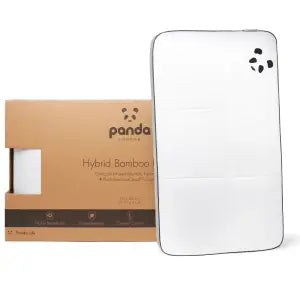 Hybrid Bamboo Pillow
Hybrid Bamboo Pillow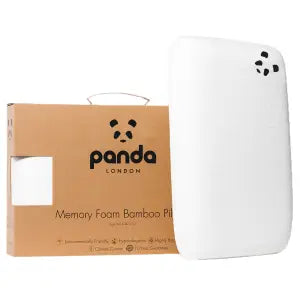 Memory Foam Bamboo Pillow
Memory Foam Bamboo Pillow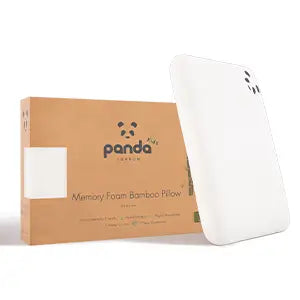 Kids Memory Foam Bamboo Pillow
Kids Memory Foam Bamboo Pillow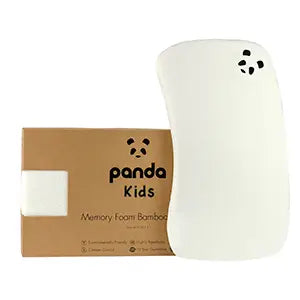 Baby Memory Foam Bamboo Pillow
Baby Memory Foam Bamboo Pillow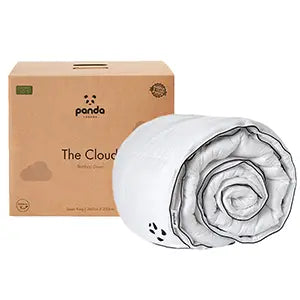 Panda Cloud Duvet
Panda Cloud Duvet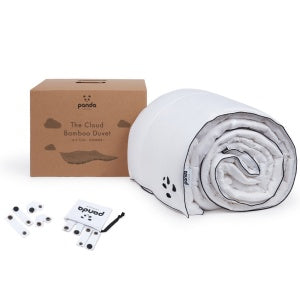 Bamboo Summer Duvet
Bamboo Summer Duvet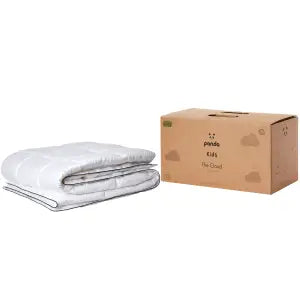 Kids Cloud Duvet
Kids Cloud Duvet

![[MemoryFoamPillow] Panda London Bamboo Memory Foam Pillow](http://pandalondon.com/cdn/shop/files/03_Memory_Foam_Bamboo_Pillow__alt01.jpg?v=1770077322&width=800)
![[MemoryFoamPillow] Panda London Bamboo Memory Foam Pillow girl hugging the pillow](http://pandalondon.com/cdn/shop/files/02_Memory_Foam_Bamboo_Pillow__alt02.jpg?v=1770077322&width=800)
![[MemoryFoamPillow] Panda London Bamboo Memory Foam Pillow on a Panda Topper](http://pandalondon.com/cdn/shop/files/Memory-Foam-Bamboo-Pillow-on-Bed-Topper-and-Adjustable-Straps-Shown-Lifestyle-Square-768x768_png.webp?v=1770077322&width=768)
![[MemoryFoamPillow] Panda London Bamboo Memory Foam Pillow Girl Holding Pillow Lifestyle](http://pandalondon.com/cdn/shop/files/01_Memory_Foam_Bamboo_Pillow__alt04.jpg?v=1770077322&width=800)
![[all] Bamboo Mattress Protector Package - PandaLondon](http://pandalondon.com/cdn/shop/files/Bamboo_Mattress_Protector_-_Packaging_Image_-_White_Background.webp?v=1721139172&width=1900)
![[all] Bamboo Mattress Protector for Hybrid Bamboo Mattress](http://pandalondon.com/cdn/shop/files/Bamboo_Mattress_Protector_New.webp?v=1721138562&width=1000)
![[all] Book on a Bamboo Mattress Protector](http://pandalondon.com/cdn/shop/products/Mattress-Protector-Listing-Images02.jpg?v=1721139189&width=1500)
![[all] Bamboo Mattress Protector Corner](http://pandalondon.com/cdn/shop/products/Mattress-Protector-Listing-Images03-e1623787734812.jpg?v=1721139189&width=1300)
![[all] Bamboo Mattress Protector Corner in line Panda London](http://pandalondon.com/cdn/shop/products/Mattress-Protector-Listing-Images04.jpg?v=1721139183&width=1500)
![[all] Panda Bamboo Mattress Protector Panda London](http://pandalondon.com/cdn/shop/files/Panda-Bamboo-Mattress-Protector-Guarantee-768x768_jpg_450393f5-91a9-499f-b15a-12d636a9a8b7.webp?v=1721139183&width=768)
